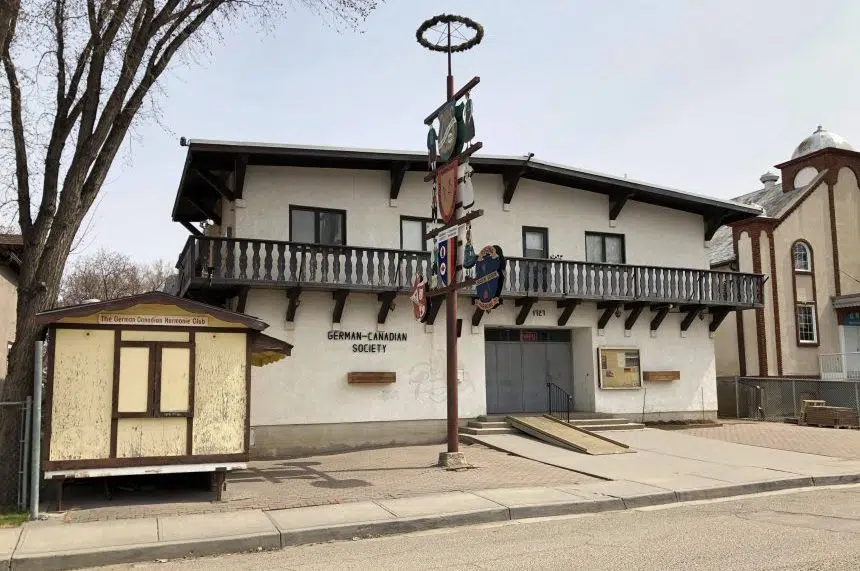It’s well known that Canada is a mosaic of cultures from around the world.
Regina is no exception to the rule, and as the city’s population has changed, so too have the cultural clubs that tied together the city’s early immigrant groups.
Right off of Saskatchewan Drive sits Regina’s German-Canadian Club, in the heart of what used to be known as Germantown. Once a bustling dance hall, beer hall, and gathering place for new German immigrants, the centre has had to adjust to modern life.
The club’s manager, Kerri Van Loosen, said a number of things have been done to modernize the club, like creating an outdoor patio, events that are catered toward families, and using the space for local concerts. She said, though, that the club has changed over time.
“In the past, because this was just exclusively German people, it was booming,” said Van Loosen, who has managed the club with her family for 10 years. “You had all the German tradesmen … They used it for their lunch, they used it for their family gatherings, they used it for their Christmas parties, their weddings — everyone was here all the time using it and it was very financially well.”
The club was formed in 1955, with the current clubhouse being constructed in 1969 after the original burned down. Between 400 and 500 families helped put the place together, where it became their solace.
During the 1980s, Van Loosen said, the club adapted some of its rules to include non-German-speaking people to be more inclusive to Canadian society.
“Obviously the views on Germanic people had changed by then too, (and people were) more accepting,” Van Loosen said. “So then when that happened, it didn’t thrive the way it once did because it wasn’t that core group of people that were invested in this place.”
Now, Van Loosen said she has had to be creative with how the club earns income, but has done a lot to keep the club appealing to a more modern crowd.
“We redid our bathrooms downstairs, cleaned them up, modernized them,” she said. “(And) we’re staying on top of social media because we know that’s how everybody thrives now … You have to have your Twitter (and) Instagram constantly promoting specials (and) advertising our events like crazy.”
Van Loosen has also added some popular events to attract customers to the club, like reintroducing Oktoberfest, and the creation of an outdoor summer solstice event.
Although the German Club has been keeping itself up and running, other groups have not been as fortunate.
The Austrian Club was forced to sell its building in 2018 due to financial struggles.
Formed in 1977 as a meeting place for Austrian immigrants to the city, the hall served as a meeting place, dance hall, and social gathering place for the cultural community.
John Jost, a part-founder of the Austrian Club, said he immigrated to Canada in the 1950s along with some 40 people from the same Austrian village, Poppendorf. At age 19, John had only $5 in his pocket when he arrived in Regina.
Now 85, John said the group started off by meeting at each other’s houses before deciding to form a club.
“They said, ‘Don’t you think we should start a club?’ ” he recalled. “Well, I said, ‘Yeah, good idea’ (and) just like that it started.”
John’s daughter and current vice-president of the Austrian Club, Sandy Jost, said the club moved to a larger hall in the Ross Industrial area after it outgrew a smaller location off Retallack Street. The new location allowed for larger dances, and even had an attached restaurant to showcase Austrian cuisine.
“From there, our club just really thrived,” she said. “We had a big membership, we had very active hunting club, lady auxiliary, (and) dance group. So it was just very active and we really thrived as a business.”
In recent times, though, Sandy said the club started to feel the crunch with stresses upon small businesses.
“Part of our business was renting our hall to weddings,” said Sandy. “Lots of weddings became destination weddings, weddings became smaller, our lounge business slowed down … and so our business began to struggle.”
It was at that point the group realized that operating a club was no longer viable.
“And then as a board, we realized upon looking at the big picture that we could promote Austrian culture in Regina without having a restaurant, and a lounge, or a hall attached to our organization,” Sandy said.
Just because the hall is sold off doesn’t mean the spirit is not there to promote Austrian culture in Regina.
“Our organization was bound together by our culture not by our business,” said Sandy, who added members of the Austrian Club are still gathering to play cards, picnic and hunt, and the dance group is still promoting Austrian culture.
But John says the feel of the club is a little different than it was in the old days.
“If you’re not from a different country, it’s kind of hard to explain how you feel to establish your country’s tradition,” he said.
Van Loosen said although the German Club may have changed and membership isn’t what it used to be, cultural clubs are still vital to the community.
“To me there’s a lot of history here,” Van Loosen said. “Everyone talks about diversity, but if we all just throw in the towel on where we’re different, we’re all just a big melting pot and I think it’s important to have an opportunity to showcase your culture (and) your tradition.”
The club remains confident that it’ll continue promoting German culture to the city and rebound through a tough economy.
“The German people of Saskatchewan, we’re a huge group and we thrive no matter what,” Van Loosen said. “I grew up in this place, dancing, singing, attending things, (and) to lose it would be very very sad. That’s why we do what we do around here and (have to) band together.”
EDITOR’S NOTE: This is a corrected version of this story, reflecting the fact Canada is considered a mosaic.







